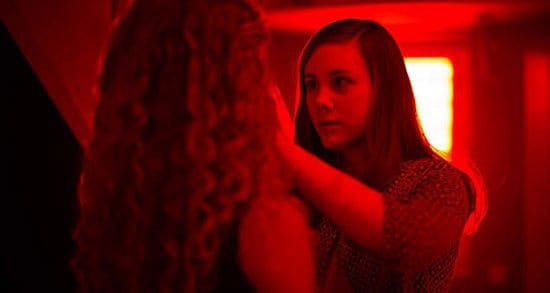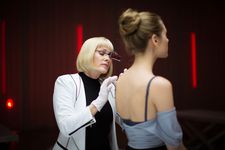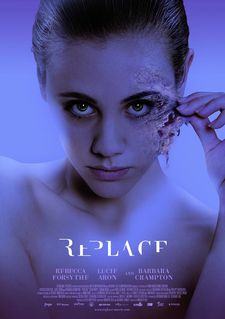 |
| A study in scarlet in Replace |
It has made waves at horror festivals around the world this year, from Fantasia to Frightfest to Grimmfest, and now Norbert Keil's sumptuously sinister Replace is getting a DVD release. It's the story of Kira (played by Rebecca Forsythe), a young woman who panics when her skin begins to dry out and break, resorting to desperate measures to preserve her life and beauty. Veering off in unexpected directions, it emerges as a clever piece of near future science fiction, and it's also a film that overflows with striking imagery.
It all began, Norbert tells me, with his personal fear of ageing.
"I had a back operation a few years back and I was faced with my mind being healthy and wanting to move but my body just saying no, you can't and I won't do what you want me to do. That loss of control is one of the major characteristics that Kira has in the film. She's always grasping for control.
 |
| A visit to the dermatologist. |
"I've always been afraid of ageing, it's always terrified me. I have a tough time handling seeing really old people, like when my grandma died and when she was bedridden, I really had a tough time sitting nd talking with her and facing that. I looked for a story that would transport all those anxieties which I found, during my research process, are very common actually. During the script development phase I found that women can relate to it even more than men. But also a lot of men said 'Yeah, that scares me too.'
"The skin was just the most obvious visual representation of all that, and you need something visual in a movie. My back operation was not very visual. Someone having back problems in a movie is kind of boring, so that's why I chose the skin thing and then, of course, she wanted to battle it. And what's the most obvious thing? Of course, she finds a way to replace her skin. How fortunate! For her." Her laughs. "Not for the victims."
Was the skin important because of its association with beauty and he way that women are valued based on their beauty?
"That certainly is one aspect of it," he says, "but it's not the primary reason. Skin is just so visual, and also something, like, if I pick a little piece of skin off my finger here, you know, everybody's done that. Everybody can relate to that. Everybody knows that pain. Of course the whole beauty thing is a big aspect of the film. The audience will always make of it what they want and I will never argue 'Oh, you are wrong' - they will always be right, whatever they see in the film will also be right because it's their interpretation - but for me, my intention was not to make a film about vanity or about beauty but primarily make a film about a woman battling her body's ageing."
Kira also suffers from amnesia, and I note that these two factors work interestingly together because skin and memory form the bedrock of personal identity.
"That's very true," he says. "I didn't put it in intentionally but what you just said makes perfect sense, and yes, of course, the loss of memory corresponds very well to her wanting to turn time back. I'm trying to steer clear of saying wanting to be beautiful again. She's not only a terrible person but also a very unfortunate, tragic person, because all her life... she must have been terribly unhappy. Even though she was successful, she must have felt that she missed out on so many things. Of course, no matter what you do you can never do everything in the world, you can never have every experience, and you have to be content to a certain point. She lacks that contentment totally, so really you have to pity her."
 |
| "Everybody knows that pain" |
Was the memory loss theme also a reflection on how many people lose memory as they age?
"That is something that, yes, I think played into it subconsciously when I wrote the script. The second husband of my mother got Alzheimer's. I can still recall the first incident where we though oh, that's weird, he should know that. It took years for him, until his body eventually forgot how to breathe, so he just stopped breathing. That also terrified me, watching that, like a person I'd spent so much time with, because he was like a second dad. I didn't consciously set out to make a statement about Alzheimer's or anything like that, but of course I tried to put all the aspects about ageing that terrify me into that persona.
"The story could have been told without the memory loss thing but I think it makes it a lot more intriguing and makes the journey a more suspenseful one. So that's also one reason why it's in there, from a storytelling point of view. But yeah, I'm pretty sure it originated with my stepdad."
Did making the film help him to deal with his fear of ageing?
"Unfortunately it did not." He laughs. "I wish I could say 'Yes, now I'm totally healed and I'm fine!' Just having become a father, that kind of helped me. My son is one week old today."
I give him my congratulations.
"Thank you," he says with one of those special smiles that only appear on people's faces a few times in a lifetime, reserved for the happiest occasions.
He must be busy now, I note.
"My wife is actually way more busy than I am, but yeah. He's out first kid and that's, um, yeah." He looks slightly overwhelmed, then observes "A very good friend of mine once, when she had her first baby, she said the strangest thing. She said 'Now I can die.' That's how fulfilled or content she was at having created another life, a new life." He pauses, then declares hastily "I would never subscribe to that statement. I still think it's a very strange thing! But if you think about it, and you think of where it's coming from, I can totally relate to that. It's like it alters everything: your view on life and certainly your view on ageing. Now I feel more comfortable with the life cycle being what it is. And now I intend to spend a lot of time with my little son."
 |
| Replace poster |
Returning to the subject of the film, I ask if he had any involvement in casting.
"Yes," he replies. "I was really blessed on this film with many, many, many things and one of those things were all my producers. There was no politics. We all wanted the best actress for the lead so we auditioned about 200 actresses in Los Angeles. We invited 20 of those to a callback and, I think, three to the second callback. And Rebecca, from the very get-go, from the first video it was like, oh my God, she's very special. The video from the third callback, when I'd worked with her a little bit, I took those casting videos to my co-producers in Toronoto and they both said it was like watching a scene from the film. That's not an audition video anymore. Because you could really already see into her soul through her eyes. I think Rebecca has that very rare gift that you can see into her soul. So yeah, she was my chice and all my producers said 'yeah.' They backed me on that and the same with Barbara [Crampton]. She was actually guggested by my co-producers, who are friends with her, which is also one of the reasons why we got to her. Because if you're a little production company or a little unknown filmmaker from Germany and you ring the doorbell of an agent in the 'States, you know, they will say 'Who are you? What do you want?'"
Barbara is an interesting choice, I say, because she's been a young starlet herself and now she has a more complex, older role - but it must have been a challenge for Rebecca to play a character who has a lot more life experience than she herself does.
"We did a month of rehearsals and research. I wrote the basis of her life story and Rebecca basically turned it into a book. The whole life story of Kira, starting with her parents. Rebecca really prepared the hell out of it. For body movement we went to a dance choreographer, who advised her on how to walk as a non-youthful person. We rehearsed that a lot and we talked for days about her emotional life and Kira's reasons for making every choice that she makes in the film very thoroughly. We really prepped the hell out of it. And Rebecca spent months doing that. She did nothing else. She's amazing."
In part two we discuss the way the film looks, shooting the gory scenes and equal opportunities for mad scientists.





















